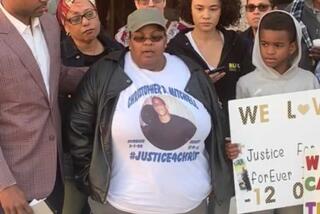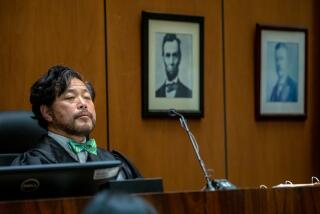Court upholds civil verdict against LAPD for withholding evidence
A federal appeals court upheld a civil jury award against two former Los Angeles police detectives Wednesday for concealing evidence that they had arrested and jailed -- for 27 months -- an innocent man.
The three-judge panel of the U.S. 9th Circuit Court of Appeals unanimously rejected Los Angeles’ appeal of a $106,000 jury award to Michael Walker and a nearly $400,000 award for attorney fees and court costs.
------------
FOR THE RECORD
An earlier version of this post said $348,000 was awarded for attorney fees and court costs.
------------
Walker, who died three years ago, was arrested in 2005 on suspicion of robbing businesses in Los Angeles with a note demanding money. Walker was then 49, an ex-felon and alcoholic living on the streets, his lawyer said.
After his arrest, the robberies continued and another man was eventually arrested and confessed. Detectives Robert Pulido and Steven Moody, who prepared the case against Walker, knew of the later, highly similar robberies and did not tell the prosecutor assigned to the case, the 9th Circuit said.
“They knew, before Walker was bound over for trial, that additional demand-note robberies, perpetrated with the same distinctive modus operandi as those for which Walker was being held, had occurred in the same part of Los Angeles after Walker was in police custody,” the panel said.
The court said Pulido also knew that another man, Stanley Smith, had confessed to some of the robberies and that the crime spree ended after that man’s arrest.
“Moody and Pulido never disclosed any of this information -- not the continuing crime spree, not the similarities of those continuing crimes to the crime for which Walker was being detained, not Smith’s arrest, and not Smith’s confession -- to the prosecutor pursuing the case against Walker,” the court said.
Instead, the officers falsely claimed in police reports that the robbery spree ended with Walker’s arrest, according to the panel.
Walker’s public defender finally obtained evidence of the later robberies after repeated requests. The evidence showed that Smith’s fingerprints matched those found at the scene of a robbery for which Walker had been charged.
“As soon as the prosecutor was made aware of this evidence, he dropped the charges against Walker,” the court said.
A Los Angeles judge later declared Walker “factually innocent.” Walker sued the city of Los Angeles and the detectives for violating his constitutional rights.
A jury determined the officers had demonstrated deliberate indifference or reckless disregard for Walker’s rights or for the truth, and had withheld or concealed evidence that strongly indicated Walker’s innocence, the 9th Circuit said.
“A police officer’s continuing obligation to disclose highly exculpatory evidence to the prosecutors to whom they report is widely recognized,” the panel said.
John C. Burton, who represented Walker in the federal civil rights case, said Walker’s health deteriorated after his release from jail, and he died from an alcohol-related disease.
“They really took his last couple of healthy years,” Burton said.
He said he and his co-counsel “were very motivated to settle the case because we knew that it would really change the quality of life for him for the time he had left.”
“The city never would offer a dime,” Burton said. “And that was true even after the judgment was returned and the fee award.”
Burton blamed the mistaken incarceration on “police culture.”
“Police culture says never, ever admit you made a mistake,” Burton said.
An LAPD spokeswoman said she did not know when or why Moody and Pulido left the force. She said city officials are reviewing Wednesday’s ruling. A spokesman for the city attorney’s office declined to comment.
Burton estimated the city will now owe more than $500,000, which will include additional attorney fees for the appeal. The $106,000, with interest, will be inherited by Walker’s mother.
Burton said the jury amount was relatively low because Walker was poor and had not suffered major economic losses while in jail. The jury did not award any punitive damages.
Police arrested Walker after a clerk at one of the businesses that had been robbed saw Walker and thought he looked like the robber. Walker generally matched the description of the robber, a middle-aged African American man with a height of 5-foot-6 to 5-foot-7 and weighing 160 to 180 pounds.
Walker waived his rights and consented to an interview with police. He also allowed police to search his belongings. No evidence linking him to the robbery was found, the court said.
Twitter: @mauradolan
More to Read
Sign up for Essential California
The most important California stories and recommendations in your inbox every morning.
You may occasionally receive promotional content from the Los Angeles Times.











